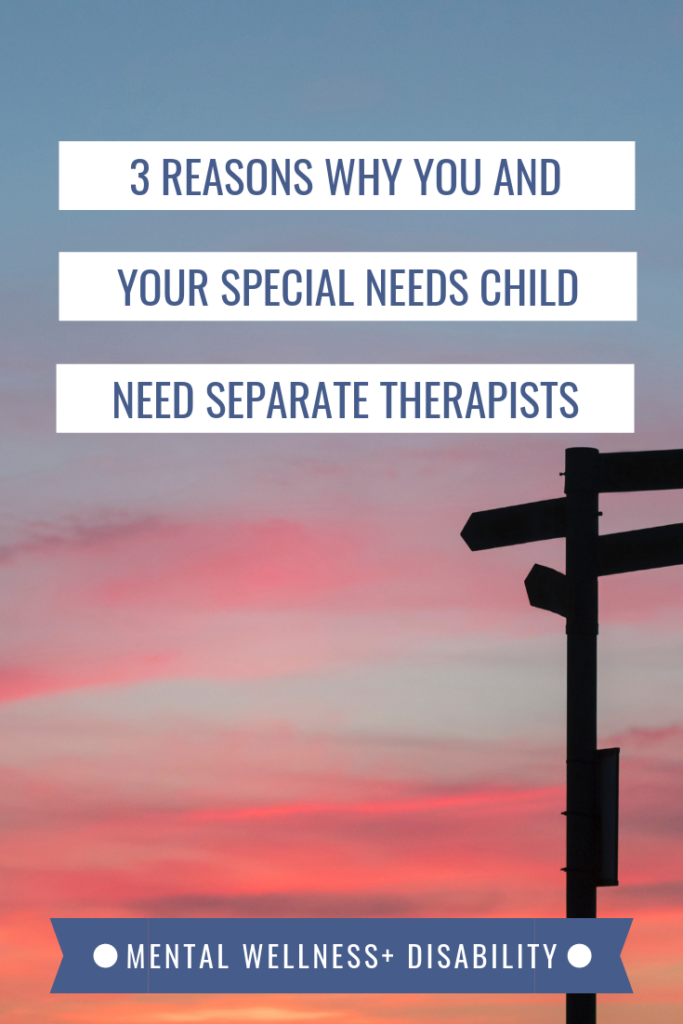A one-stop-mental-health-shop that can help you AND your child? Just one new parking lot to learn, one new therapist to communicate with for you both…that’d be amazing right? In theory this probably does sound like an ideal situation if you’re a busy, exhausted special needs parent.
Here in Cary, NC, we have one of the highest incidence rates of Autism in the country. Plus, lots of special needs families move to our area because of the amazing local hospitals and other disability resources.
With such a large special needs community, I hear from lots of parents who ask if I can provide individual counseling to them and their child at the same time. I wish I could say yes, because I want to do everything I can to make counseling accessible to my counseling clients who are raising kids with disabilities.
But, I’ve learned that it’s almost always better if parents and kids each have their own therapist. Here are three reasons why.

Therapeutic alliance
There is a ton of research backing up that how well you connect with your therapist is a better predictor than what type of therapy they offer when it comes to knowing whether therapy will “work”.
In counseling terms, ‘therapeutic alliance’ is the name for the relationship between a client and counselor. The stronger the alliance, the better it is for the client.
When your therapist doesn’t get you
When you are working with a therapist who just doesn’t get you, it feels awful.
You feel like they’re judging you, and so you constantly defend your choices. You waste precious time explaining things that you’ve already been clear about.
Most troublingly, I talk to many special needs parents who feel so alienated from their therapist that they don’t even try to bring up their ‘real’ struggles. They fear that their therapist couldn’t understand, let alone support them to make the kind of changes that would stick.
So they say nothing about the daily challenges of raising a unique kid in a world that doesn’t appreciate them. And because they’re too vulnerable to speak openly about their real challenges, no real change happens.
They stay stuck.
When there is therapeutic alliance
But when there’s strong therapeutic alliance there? It’s a whole other ballgame.
Working with a therapist who you feel a genuine connection with allows you to be your real, raw self.
You can crack a dumb joke because you know they’ll laugh along with you.
You can finally say those ugly things that no special needs parents are supposed to think, let alone believe.
When you are free to be just you, no need to hide or keep secrets, that’s when therapy really works.
Two family members seeing the same therapist for individual therapy poses a risk to therapeutic alliance
When you and your child are seeing the same therapist though, it splits the therapist’s alliance.
You’re each bound to share negative impressions of the other at some point. With this new information to integrate, the therapist struggles to keep a genuine, unconditional warmth for you both.
And that warmth and acceptance is the root of therapeutic alliance.
When there are too many people’s versions of the truth to hold onto, a therapist will undoubtedly slip into ‘taking sides’.
To be clear, this isn’t saying that couples or family therapy doesn’t allow for therapeutic alliance. Those types of therapies work because the relationship or the family dynamic is the client. The interaction between people, but not the people themselves, is the focus of counseling.
But, when more than one person in a family is seeing the same therapist for individual counseling at the same time, it is very likely to fracture therapeutic alliance for one or both. Because I know how critical therapeutic alliance is for healing, it’s not something I’m willing to risk.
Confidentiality and acting in each client’s best interest
When seeing two people in the same family, maintaining confidentiality and acting in each person’s best interest are practically impossible. I’m combining these two reasons into one, because as you’ll see they are intrinsically linked.
All counselors have a code of ethics that they are bound to follow. Counselors like me follow the American Counseling Association, Psychologists follow the American Psychological Association, and so on.
While there are some differences, one thing that all the ethics codes have in common is that they require therapists to:
- Act in their client’s best interest
- Maintain their client’s confidentiality
There are so many ways that it would be impossible to act in my client’s best interest and protect their confidentiality if both a child and their parent are my client.
Imagine I’m seeing an older teen with Down syndrome who feels powerless. I might be coaching him in developing his ability to self-advocate, and to clearly communicate his wants and needs. He’s gaining confidence in his abilities with each ‘win’ that he has in communicating effectively. He’s seeing that he’s capable of doing more, and he realizes that he wants to push his independence even further. He feels ready to move into his own apartment.
Say I’m also treating the teen’s mother for anxiety. Much of her anxiety has to do with what the future holds for her child because of his disabilities. She doesn’t want friends and family accusing her of ‘putting him in a home’. She worries that someone will take advantage of him if she isn’t closely supervising his daily activities. She’s had physical symptoms of panic during our sessions when I ask what will happen when she is no longer able to care for her son. Her fear is real.
Two family members seeing the same therapist for individual therapy threatens confidentiality and clients’ best interest
What happens when the teen client tells me that he wants to challenge his mother, point out ways that she has ‘babied’ him, and ask her to commit to helping him plan to move out within the next year?
Knowing the mom’s anxiety around this issue, I might feel compelled to forewarn her. I might even want to role-play with her or discuss coping strategies to help her get through this difficult conversation.
But, if I did give the mom a heads up, I would be breaking the teen’s confidentiality. If I don’t, am I really acting in her best interest, given the information that I have?
These are not, by the way, contrived hypothetical clients.
Most of the teens and adults with disabilities that I see are desperately craving more control and independence.
Pretty much all the parents that I work with are struggling with what the future will hold for their child.
It’s almost a guarantee that this is the situation I’d be up against if I agreed to counsel both parent and child.
Other ways that confidentiality and clients’ best interest can be threatened if parent and child see the same counselor
Say, for instance, if a child brings up something about a parent that the parent hasn’t disclosed yet. Maybe the child client comments about Mom drinking so much alcohol that some nights she dozes at the dinner table.
If Mom hasn’t brought up her drinking, my hands are again tied.
I’m stuck knowing information that I can’t ethically discuss, even if I think it’s in my client’s best interest to do so.
There are other, subtler ways that I might unintentionally break a client’s confidentiality if I were treating a family member.
My poker face is non-existent; whether I’m surprised, upset, or delighted, you can always read it on my face. I could easily ‘leak’ confidential information by accident with my body language or facial expression.
I value my client’s right to privacy and my obligation to act in their best interest.
While I want both family members to receive the therapy that they need, it isn’t worth risking those ethical obligations for me to be their only provider.
Moving forward with finding the best fit therapist for you and your child
It can be really frustrating to finally find a professional who you believe can help you and your child, and then learn that that person isn’t willing to help you both.
When I talk to parents who want me to see them and their child for individual therapy, I explain the 3 reasons why I believe that parents and their kids need separate therapists.
Then, I talk with the parent about their needs and their child’s.
Depending on the issues, symptoms, and challenges that each person is experiencing, I will typically see one person as my client, and refer the other person to another local counselor.
Because I want you both to get the help you need. Just not both from the same counselor!












